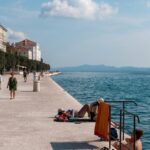ZAGREB, December 7, 2018 – Human Rights House Zagreb has published a report on the obstacles and challenges faced by human rights advocates and organisations in Croatia which deal with the past, transitional justice, human rights, refugee rights, ethnic minorities, the LGBTIQ community, and environmental protection.
The report says decision makers often fail to publicly support the work of human rights defenders, who are discredited, verbally threatened and intimidated, including with destruction of equipment and work premises.
“There is no public condemnation of threats against and intimidation of human rights defenders, whereby one fails to clearly send the message that violence is unacceptable,” Human Rights House Zagreb said in a press release on Friday.
It notes that attempts are made through a broad interpretation of the law to criminalise the work of human rights defenders who deal with refugee rights, and that they are linked to people traffickers and criminal activities without foundation.
When they accompany asylum seekers to police stations, activists are interrogated and held there for hours without explanation or justification, said the press release. “Accusations of criminal activities are presented in the media tendentiously, undermining human rights defenders’ reputations and discouraging future volunteers. Those who deal with environmental preservation face pressures and lawsuits from private investors because they attempt to protect the public interest.”
The report says human rights defenders’ communication with the public authorities is obstructed and that they are concerned about the deteriorating cooperation between defenders of refugee rights and the relevant authorities.
The report says the adoption of restrictive local regulations and commercial use of public space have a negative effect on the freedom of assembly. “Counter-protests have an indirect negative impact on the exercise of the right to free and peaceful public assembly of the defenders of the Serb national minority’s human rights.”
Human Rights House Zagreb also said that press freedoms were restricted and that fake news and hate speech had a negative impact on freedom of expression. It said human rights violations were not adequately covered and that independent media, which have a key role in the protection and promotion of human rights, found it increasingly difficult to survive due to lack of sustainable public funding.
“In 2018, aside from the 70th anniversary of the Universal Declaration of Human Rights, we are also observing the 20th anniversary of the UN Declaration on Human Rights Defenders which defined in one place for the first time the minimum standards which states must honour to ensure undisturbed and progressive work on the protection and promotion of human rights,” said the press release.
For more on the human rights in Croatia, click here.







